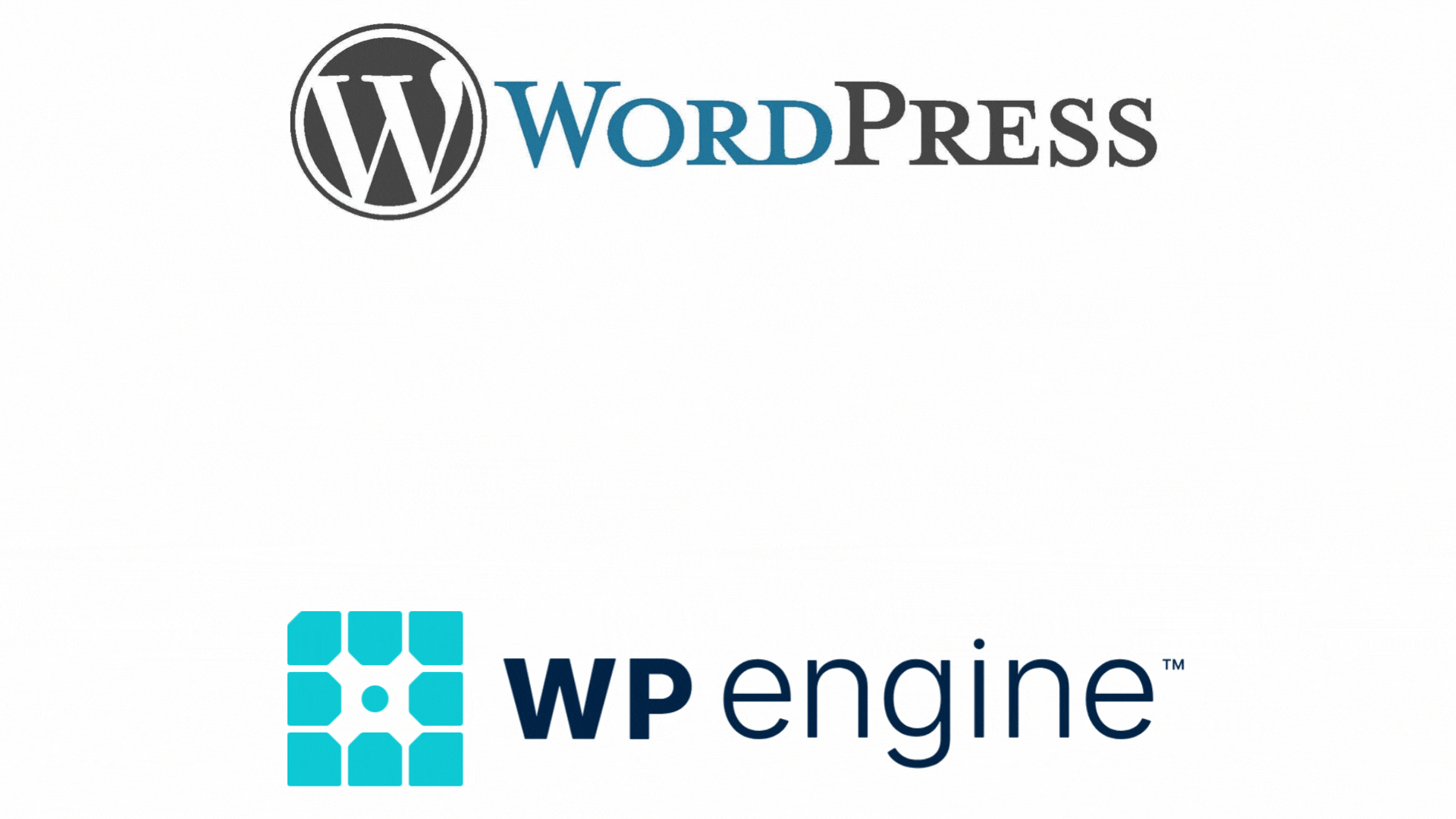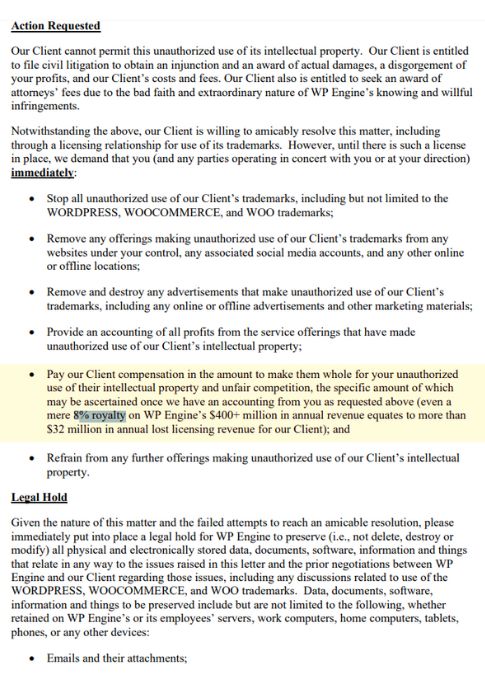Why the
WordPress versus WP Engine
Dispute Matters
Last week was something of a nailbiter for over a million WP Engine users as a legal drama unfurled in public view. However, for many observers the spectacle was hard to follow as many of the parties involved shared similar names or involved companies that many WordPress users have never heard of.
Regardless of the confusing nature of the dispute, the impacts were clear for all to see when WordPress.org banned the WP Engine from accessing its resources. This ban meant that millions of websites suddenly lost access to updates and core functionality, with essentially zero notice.
Today we’re going to shed light on the reasons behind the legal battle, clarify which parties are involved, and look at what the possible consequences of a WP Engine ban could mean for millions of users, even those using other WordPress hosts.

Who’s involved: The Many Flavors of WordPress
The recent drama involving WordPress involves a few main characters, and it’s essential to understand who they are before the situation can make sense.
- WordPress
WordPress is a free-to-use, open-source web content management tool. By virtue of its flexible, user-friendly design (not to mention being free!), WordPress is by far the most common web content management software in use – accounting for up to 43% of the market. This software is available at WordPress.org and is distinct from WordPress.com. For clarity, going forward, this article will refer to WordPress (the free, open-source tool) as WordPress.org. - WordPress Foundation
The WordPress Foundation is a non-profit organization which supports the development of WordPress.org. Established in 2010 by Matt Mullenweg, the foundation’s stated purpose is to “ensure free access, in perpetuity, to the software projects we support.” - WordPress.com
WordPress.com is a web hosting service owned by Automattic, Inc. WordPress.com runs a modified version of WordPress.org and offers both free, ad-supported hosting services as well as paid-upgrades which remove ads and provide additional functionality. - Automattic, Inc.
Founded in 2006, Automattic is the for-profit business which owns WordPress.com. Matt Mullenweg is the company’s founder and current CEO. - WP Engine
WP Engine is a WordPress hosting service, similar to WordPress.com. Unlike WordPress.com, WP Engine only offers paid versions of their service. However, similar to WordPress.com, the WP Engine experience is slightly different from the WordPress.org web content management service upon which it is based. Of note, WP Engine has been owned by the large private equity company Silver Lake since 2018. - The WordPress Community
One thing that makes WordPress such a powerful website content management system is its robust and engaged developer community. These developers create plugins and themes which allow a nearly infinite degree of customization and are absolutely part of the reason for the tool’s widespread popularity and success.
Importantly, the developers are not paid directly by any organization associated with WordPress. In many cases their plugins are free to use, while some adopt a freemium model where certain features are only available after users pay to access them.
The Timeline of the WordPress/WP Engine Dispute
September 20, 2024:
At WordCamp US in Portland, Oregon, WordPress co-founder Matt Mullenweg criticized WP Engine in his keynote speech. He accused WP Engine of profiting heavily from WordPress without contributing enough to its open-source development and by extension causing harm to the WordPress Community. Mullenweg claimed WP Engine was generating $450 million annually while contributing only $100,000 worth of development time.
September 23, 2024:
WP Engine responded to Mullenweg’s criticism by sending a cease-and-desist letter to Automattic, demanding that Mullenweg retract his statements. This letter also revealed failed negotiations between the companies over licensing revenue.
September 23, 2024:
Automattic responded with its own cease-and-desist letter, accusing WP Engine of unauthorized use of WordPress and WooCommerce trademarks. Automattic sought to enforce its intellectual property rights globally.
September 25, 2024:
Mullenweg announced that WordPress.org had banned WP Engine from accessing its resources, including plugin and theme repositories. This effectively blocked WP Engine customers from updating or installing new plugins and themes.
September 26, 2024:
The ban sparked significant backlash from WP Engine users, who raised concerns about security risks from not being able to update their sites. Online forums and social media saw widespread criticism of the decision.
September 27, 2024:
Following community pressure, Mullenweg announced that the ban on WP Engine was temporarily lifted until October 1, 2024, giving WP Engine time to resolve the issues. This reprieve allowed WP Engine customers to regain access to WordPress resources.
September 30, 2024:
In response to the looming deadline, WP Engine has reworded their hosting packages, changing from “Essential WordPress” to “Essential”, “Core WordPress” to “Core” and so on. Additionally, a footer has been added to their pages which reads:
“WP Engine is a proud member and supporter of the community of WordPress® users. The WordPress® trademark is the intellectual property of the WordPress Foundation, and the Woo® and WooCommerce® trademarks are the intellectual property of WooCommerce, Inc. Uses of the WordPress®, Woo®, and WooCommerce® names in this website are for identification purposes only and do not imply an endorsement by WordPress Foundation or WooCommerce, Inc. WP Engine is not endorsed or owned by, or affiliated with, the WordPress Foundation or WooCommerce, Inc.”
What is this really about?
On the face of it, this dispute can look a little silly – perhaps even personal. However, the legal filing by Automattic against WP Engine included a piece of information that revealed this is about dollars and cents. Within Automattic’s cease and desist is mention of an 8% royalty fee in order to use the term WordPress (as well as Woocommerce, an e-commerce platform also owned by Automattic.)
However, WP Engine contends that their usage of the word WordPress falls under fair use and thus Automattic has no grounds for claiming royalties.
Here, it is important to mention that Automattic is not the owner of the WordPress trademark. Instead, WordPress.org owns the rights and licenses its usage to Automattic.

WordPress’ Cease and Desist Letter screenshots taken from:
https://automattic.com/2024/wp-engine-cease-and-desist.pdf
WP Engine Temporarily Banned From WordPress Resources
If these two businesses had contented themselves with tossing lawsuits back and forth then this drama would likely have unfolded entirely behind the scenes. However, here is where things get messy: WordPress.org (the free tool which is run by the non-profit foundation WordPress Foundation) blocked WP Engine’s access to their resources.
This immediately prevented WP Engine users from being able to update their existing plugins or install new plugins and severely hampered their site’s functionality.
In a post on WordPress.org, Matt Mullenweg delivered a barbed account of WP Engine’s many failings that led up to the ban, concluding with a message reading “if you want to experience WordPress, use any other host in the world besides WP Engine.”
Community Outcry and a Temporary Ban Reversal
Within hours of the block, the WordPress community had taken to forums and blogs to express their outrage and dissatisfaction with the choice to ban WP Engine. Many expressed disappointment that this legal dispute ultimately ended up negatively affecting the users while others have suggested that Mullenweg’s actions go so far as to subvert the open-source nature of WordPress.org.
Relenting to pressure, WordPress.org unblocked their resources, allowing WP Engine access until October 1, 2024.
WordPress.org Filing for New Trademarks:
While this issue at first seems to be limited to WP Engine, the problem goes deeper. In July, WordPress.org filed for trademarks for “hosted WordPress” and “managed WordPress,” meaning that thousands of independent hosting companies could find themselves in a similar situation.
An Uncertain Future
At the time of writing, it is unclear what the future holds for WordPress. It would seem that their usage of the trademark falls within fair-use, but ultimately that is a decision that a court needs to decide. While WP Engine has made some changes to their copy, it remains to be seen if this will satisfy those at Automattic and WordPress.
It is clear that Mullenweg is in a uniquely privileged position – as he leads both the not-for-profit WordPress Foundation as well as for-profit Automattic – and looks to be using this for Automattic’s benefit. Ultimately, we will need to wait and see if and how these legal challenges unfold before there is a clear answer.
